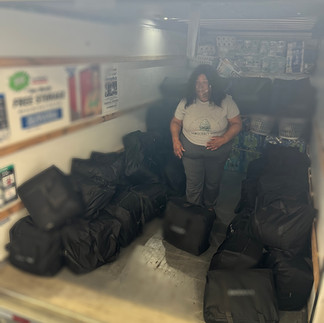Author: The Honorable, Professor La’Meshia Whittington, 1st Vice-Chief of the Eastern Band of the Apalwahči Nation
As the cold winds of winter begin to sweep through the Appalachian mountains, I find myself reflecting on a history that is both deeply painful and profoundly instructive. This year, as we gather to commemorate Indigenous Remembrance Day—a day that for some is just another holiday known as Thanksgiving—I am acutely aware of the weight of our shared past and the stark realities of our present.

Our family story is like that of many families across the nation, a story marked by displacement and survival. The journey of my ancestors began in the land we know as Western North Carolina, a place rich with the history of the Mvskoke (Creek) Confederacy and the vibrant tapestry of Indigenous life. Yet, this land has also been stained by violence and oppression. Forced off our ancestral lands and into the shadow of newly formed plantations, our people faced unimaginable trials. Many Creek women, once leaders of their families and communities, found themselves enslaved and married to Scots-Irish oppressors, forced to bear children under the weight of a shameful legacy. Those deemed of no value to the plantation system were cruelly uprooted, traveling the harrowing Trail of Tears across the Appalachians to Oklahoma, their backs burdened with blankets laced with smallpox, their footsteps echoing through the cold, frigid snow.

It is a narrative that speaks of loss—a loss that saw many of our ancestors perish along that brutal journey, their bodies forever intertwined with the land they had called home. Yet, as we remember the pain, we must also recognize the resilience that has surged through generations. It is this resilience that has brought me to the present, where I stand alongside my family, not as victims of history, but as agents of healing.
This year, in a moment that feels almost surreal, we have found ourselves delivering brand new blankets to families in the Appalachians, families that comprise a beautiful mosaic of backgrounds: Afro-Indigenous, Black, Hmong, Laotian, Filipino, Liberian, Latino, and White. It is a striking and poignant irony that the descendants of those who once forcibly moved our people, who once covered us in those same blankets of oppression, are now receiving life-saving aid from the descendants of the Indigenous—people who embody the very legacy of survival and strength.
As I prepare to sit in prayer with my family, I am reminded that these moments are not just about recognizing our history; they are about confronting it, grappling with the dichotomy of our existence. The same Hurricane Helene that laid bare the devastation of our past also exposed the inequities that persist today. The sundown towns, remnants of systemic racism, remind us that the scars of history are not merely artifacts of the past, but living wounds that continue to affect our communities.
This Indigenous Remembrance Day, as I reflect on the dark history associated with Black Friday—a day that often overshadows our remembrance with consumerism—I am filled with a renewed sense of purpose. We are the descendants of powerful kingdoms, still shaping the course of our homeland. We are the descendants of genocide and land grabs, yet we are thriving, holding the line between life and death for those around us. Our ancestors endured, and so must we.
In this season of reflection, I will remember my family—their struggles, their triumphs, their unwavering spirit. I will honor the teachings of my ancestors as we provide for others, recognizing that to care for those in need is to reclaim our power and purpose. We are not defined solely by our pain; we are defined by our capacity for love, compassion, and community.
As we gather this holiday season, let us remember the complexity of our history. Let us embrace our identities, not just in the light of our struggles, but in the strength we draw from them. We are the Eastern Band of the Appalachian Nation, the people of Shaconage—the Land of the Blue Smoke. We are here, resilient and united, ready to carry forward the legacy of our ancestors, as the anointed and appointed by God the Creator and children of Mother Earth, ensuring that their stories and sacrifices are never forgotten. This is our time to heal, to give, and to reclaim our narrative in a world that often seeks to erase it.












Comments